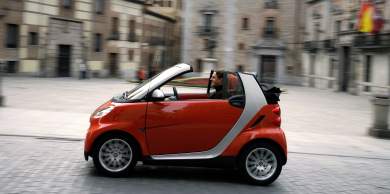A total of 317,960 new cars were registered, a jump of 20 percent over the same month last year, VDA said.
With the exception of Audi and Porsche, which posted 9.1 percent and 13.5 percent growth, respectively, every German automaker saw registrations outpace the overall growth rate.
Volkswagen led the way with 64,428 new car registrations, 25 percent growth over April 2007. Daimler luxury brand Mercedes-Benz saw 26 percent growth, with 36,038 new registrations, while the carmaker’s subcompact Smart model saw 69.8 percent growth over April 2007, with 3,858 registrations.
With Mini, BMW saw 27.7 percent growth over last year to 30,689 new registrations. GM subsidiary Opel showed 25.5 percent growth to 27,994 new cars registered.
“The domestic market is on the path to stabilization,” a VDA statement said.
The federation pointed to a drop in unemployment and improved prospects for a pick-up in consumer spending as factors that contributed to the results.
The April figures are an upturn over March, which most automakers saw declining new car registrations – attributed in part to early Easter holidays. There were three more working days in April this year than in 2007.
In the first four months of 2008, new car registrations have increased by an annualized 7.0 percent, with more than one million deliveries.
“That gives hope for a more stable year than in 2007, even though a vigorous rebound is not yet underway,” VDA president Matthias Wissmann was quoted as saying.
Last year was the worst for the German car market since the country was reunified in 1990.
A study by management consulting firm McKinsey & Co. summarized on Sunday in the German newspaper Die Welt predicted Germany’s auto industry would no longer be a leading driver of new jobs.
Titled Deutschland 2020, the report predicted a maximal annual growth potential of 1.3 percent through 2020 for Germany’s auto industry, the lowest among 11 industries surveyed in the report. Without economic reforms, the report predicted auto industry growth of only 0.3 percent through 2020 and a loss of 100,000 industry jobs.
dpa/afp



 Please whitelist us to continue reading.
Please whitelist us to continue reading.